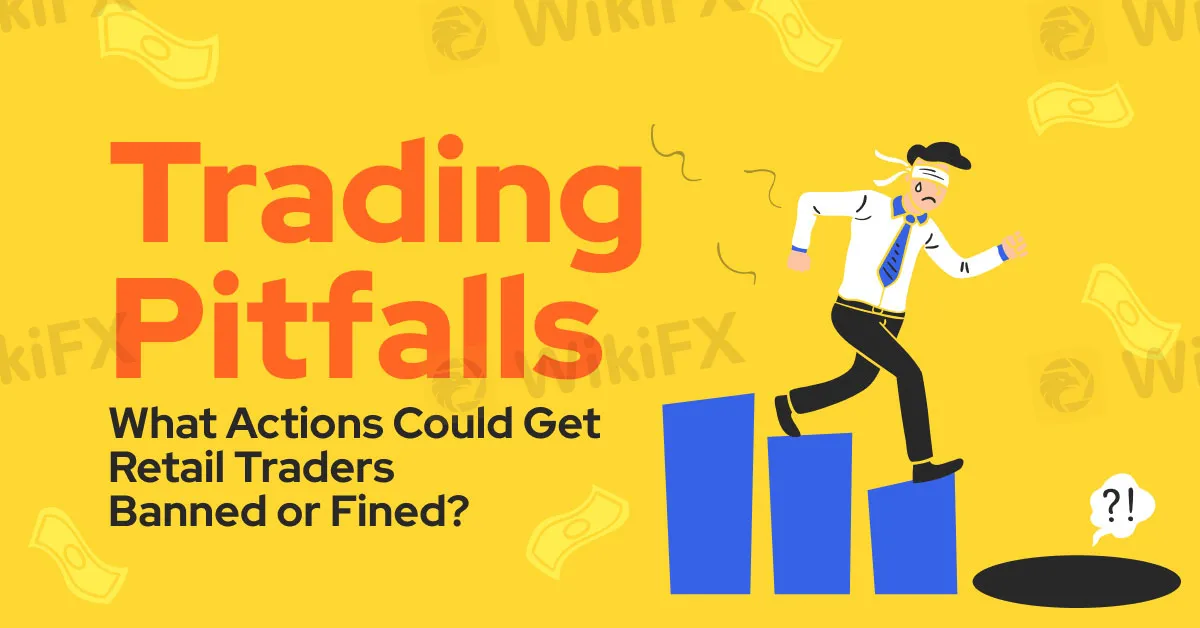简体中文
繁體中文
English
Pусский
日本語
ภาษาไทย
Tiếng Việt
Bahasa Indonesia
Español
हिन्दी
Filippiiniläinen
Français
Deutsch
Português
Türkçe
한국어
العربية
Trading Pitfalls: What Actions Could Get Retail Traders Banned or Fined?
Abstract:Disruptive trading practices that can get retail traders banned or fined.

In the fast-paced world of online trading, retail traders must navigate a complex landscape of rules and regulations designed to maintain fair and orderly markets. Disruptive trading practices, which can undermine market integrity or create unfair advantages, are closely monitored by regulatory bodies. Traders engaging in these practices risk severe consequences, including bans, fines, or suspensions. Understanding these practices is crucial for anyone involved in online trading to ensure compliance and avoid punitive measures.

Market manipulation involves actions intended to deceive or mislead other traders, often to benefit from the resulting market moves. This can include practices such as “pump and dump,” where traders artificially inflate a stock's price through false or misleading statements before selling off their positions at the inflated price. Another form is “spoofing,” where traders place large orders with no intention of executing them, only to cancel them before completion to influence market prices. Both practices are illegal and can lead to significant penalties, including bans and fines.

Front-running occurs when a trader executes orders based on non-public information about upcoming large trades by clients or other entities. For example, if a trader learns of a large order from a client and then trades in advance of that order to profit from the expected price movement, this constitutes front-running. This practice undermines market fairness and transparency, and traders found guilty can face severe regulatory actions.

Wash trading involves a trader buying and selling the same financial instrument simultaneously or within a short time frame to create the illusion of high trading volume and liquidity. This practice can mislead other traders about the true market conditions and is considered a form of market manipulation. Regulatory authorities view wash trading as a serious offense, and those caught can face substantial fines and trading bans.

Insider trading is the buying or selling of securities based on material, non-public information about a company. This illegal activity undermines the principle of a level playing field in financial markets. Retail traders found guilty of insider trading can face criminal charges, significant fines, and lengthy trading suspensions.

While not illegal per se, excessive risk-taking can lead to regulatory scrutiny if it involves practices that threaten market stability. This includes trading strategies that rely on extreme leverage or speculative bets without proper risk management. In such cases, regulatory bodies may impose fines or suspend trading privileges to protect market integrity.
Retail traders must be vigilant and adhere to regulatory guidelines to avoid disruptive practices that can lead to bans, fines, or suspensions. By understanding and avoiding illegal activities such as market manipulation, front-running, wash trading, insider trading, and excessive risk-taking, traders can help maintain a fair and orderly market environment. Staying informed about regulatory requirements and practicing ethical trading is essential for long-term success in the online trading arena.

Disclaimer:
The views in this article only represent the author's personal views, and do not constitute investment advice on this platform. This platform does not guarantee the accuracy, completeness and timeliness of the information in the article, and will not be liable for any loss caused by the use of or reliance on the information in the article.
Read more

What Every Trader Must Know in a Turbulent Market
The global financial markets are no strangers to periods of uncertainty, and recent weeks have been a testament to their unpredictable nature. Heightened volatility across major indices, including the US stock market, has left traders reassessing their strategies as they face both opportunities and risks.

SEC Lawsuit Claims Elon Musk Cheated Twitter Shareholders Out of $150 Million
The U.S. Securities and Exchange Commission (SEC) has filed a lawsuit alleging that Elon Musk, the billionaire founder of Tesla and SpaceX, cheated Twitter shareholders out of more than $150 million by delaying the disclosure of his growing stake in the company as he prepared to launch a takeover bid.

NovaTech FX Scams Revealed - Hard to Withdraw Money
NovaTech, a trading platform that has recently gained considerable attention after its sudden collapse. The U.S. Securities and Exchange Commission (SEC) imposed penalties on the platform, its founders, and several major promoters. Here Let's explore this platform by examining its background and the underlying logic of its fraud scheme, and outline some key warning signs that investors should watch for when encountering similar platforms in the future.

Philippine Banks Launch PHPX Stablecoin for Cross-Border Payments
Philippine banks collaborate to launch PHPX, a peso-backed stablecoin, revolutionizing cross-border payments with real-time transfers and financial inclusion goals.
WikiFX Broker
Latest News
Wolf Capital Exposed: The $9.4M Crypto Ponzi Scheme that Lured Thousands with False Promises
Confirmed! US December non-farm payroll exceeded expectations
Spain plans 100% tax for homes bought by non-EU residents
90 Days, Rs.1800 Cr. Saved! MHA Reveals
The Yuan’s Struggle: How China Plans to Protect Its Economy
LiteForex Celebrates Its 20th Anniversary with a $1,000,000 Challenge
Misleading Bond Sales Practices: BMO Capital Markets Fined Again by SEC
Italy’s Largest Bank Intesa Sanpaolo Enters Cryptocurrency Market
What Every Trader Must Know in a Turbulent Market
400 Foreign Nationals Arrested in Crypto Scam Raid in Manila
Currency Calculator






